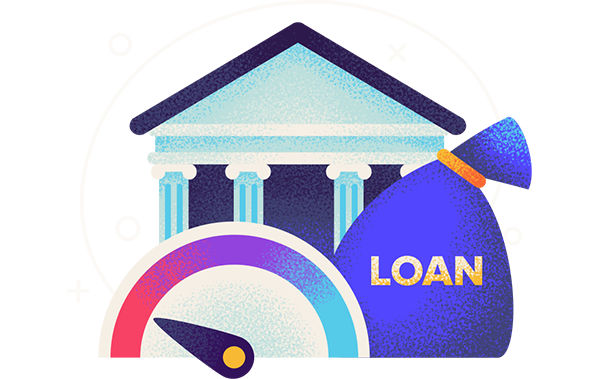To get a debt consolidation loan with bad credit, you’ll first need to compare your options and choose a loan that you can realistically qualify for given your credit score. After you decide which loan works best for you, you’ll need to apply for it and wait for a decision. Once you’re approved and you get the funds, you’ll have to pay off your existing debt and then repay the new loan over time.
Debt consolidation loans for bad credit are supposed to help you save money by combining your debts at a lower APR. However, your options for debt consolidation loans with bad credit are limited, and you may not get a lower APR than your original debts or a big enough loan for consolidation to make sense.
Compare Options for Debt Consolidation Loans with Bad Credit
When choosing a debt consolidation loan with bad credit, the most important things to compare are the APRs, loan amounts, repayment periods and credit score requirements. You need a good chance of getting approved for a big enough loan to consolidate with a low enough APR to save you money. For your convenience, below is a comparison of some of the best debt consolidation loans for people with bad credit.
Best Debt Consolidation Loans for Bad Credit
| Company | APR | Loan Amounts | Score Required |
|---|---|---|---|
| Universal Credit | 11.69% - 35.99% | $1,000 - $50,000 | 580 |
| OneMain Financial | 18% - 35.99% | $1,500 - $20,000 | 600-650* |
| LendingPoint | 7.99% - 35.99% | $1,000 - $36,500 | 600 |
| Upgrade | 7.74% - 35.99% | $1,000 - $50,000 | 620* |
| Upstart | 6.6% - 35.99% | $1,000 - $75,000 | None |
*According to multiple third-party sources
For more info and offers, you can compare debt consolidation loans for bad credit on WalletHub. You should consider some alternatives to debt consolidation loans in your research, too.
Alternatives to Debt Consolidation Loans for People with Bad Credit
Unsecured personal loan
Several personal loan providers accept applicants with bad credit. If you have bad credit, you can often expect APRs above 30% and it may be difficult to get a loan amount higher than $5,000. These loans will most likely have an origination fee as well, which may add another 0% to 8% on top of the total debt you already owe.
Secured personal loan
Secured personal loans are similar to unsecured personal loans but they require collateral. If you don’t pay the loan back, they can take possession of the collateral. You’re also likely to get lower APRs on a secured personal loan than an unsecured personal loan. In addition, valuable collateral can get you bigger loans.
Home equity loan
A home equity loan lets you borrow a lump sum of money secured by your house. You’ll have up to 30 years to pay the money back in some cases, and the APRs are extremely low (4% to 8%). Unfortunately, home equity loans usually require a credit score of 620 or higher. If you have an especially valuable house with a lot of equity, you might have a shot at approval even with bad credit.
Home equity line of credit
An HELOC is basically a home equity loan that functions like a credit card. You have a certain credit limit based on your equity, and you can withdraw up to that amount of money any time during the line of credit’s “draw period.” You’ll only need to make monthly payments on what you choose to borrow. HELOCs have the same general requirements as home equity loans.
Credit card
You can consolidate debt by doing a balance transfer to a credit card. The best credit cards for consolidating debt are ones that have 0% introductory APRs on balance transfers, but those cards tend to require good or excellent credit to qualify. With bad credit, you’ll only be able to qualify for expensive unsecured credit cards with low credit limits or secured credit cards that require you to put down a security deposit.
Debt Consolidation Options Comparison
| Consolidation Method | Unsecured Personal Loan | Secured Personal Loan | Home Equity Loan | Home Equity Line of Credit | Credit Card |
|---|---|---|---|---|---|
| Credit Score Required | 580+ | No minimum | 620+ | 620+ | No minimum |
| Dollar Amount Available | $1,000 - $100,000 | $1,000 - $100,000 | Based on your equity amount | Based on your equity amount | Less than $1,000, usually |
| Standard APRs | 6% - 36% | 6% - 36% | 4% - 8% | 4% - 8% | 10% - 35% |
| Collateral Required | None | Bank account, vehicle, stocks, etc. | Your house | Your house | None |
Apply for the Best Debt Consolidation Loan for Your Needs
Depending on the lender, you can apply for a debt consolidation loan online, in person or over the phone. You’ll need to give the lender some personal information when you apply, like your name, address and date of birth. The lender will also ask for some financial information, such as your employment history and income.
Before you apply, you should also check if you’re pre-qualified, to see which loan providers may approve you and what rates you may qualify for. Pre-qualification will not affect your credit score.
Get Funded and Pay Off Your Existing Debts
Applicants often receive approval the same day they apply and funding as soon as the next day. However, that doesn’t always happen. If it doesn’t, you should find out if you’re approved and get the funds within 7 business days of applying for a personal loan. Some home equity products may take over a month to get back to you, though.
Once you receive the funds, you’ll be able to use the money to pay off the debts you owe, like credit card debt, personal loan debt or medical bills. Some lenders will distribute payments for you, as long as you tell them where the money needs to go. If they don’t provide this service, you’ll have to distribute the funds on your own.
Pay Off Your New Consolidation Loan and Improve Your Credit
Once you pay off your old debts, you need to repay the new loan. You’ll only have to make one payment per month to your lender, and it may be lower than your old monthly payments due to a reduced interest rate, a longer payment period or both. As you make monthly payments, your lender will report positive information to credit bureaus, which should increase your credit score.
You can use WalletHub’s loan calculator to estimate the amount you’ll end up paying over the life of the loan.
Tips for Finding the Best Consolidation Loan with Bad Credit
- Pick the best consolidation method for you. A personal loan (either unsecured or secured), a home equity loan or line of credit, or a credit card may work best, depending on how bad your credit is and how willing you are to put up collateral.
- Improve your credit score. If you’re having a hard time getting approved for a debt consolidation loan with bad credit, you may want to spend some time improving your credit score. The better your score is, the better the terms of the loan and your approval odds will be. You can check your credit score for free on WalletHub.
- Pre-qualify. Depending on the debt consolidation method you choose, you may be able to pre-qualify and see your potential rates ahead of time. You can pre-qualify for a personal loan on WalletHub, and you might be able to check for pre-qualification on a credit card issuer’s website. Unfortunately, you can’t pre-qualify for home equity products.
- Apply for the loan or credit card online. Most lenders allow you to apply online, which speeds up the process and helps you get the funds sooner.
- Consider debt consolidation alternatives. If a debt consolidation loan isn’t right for you, you may want to consider debt management programs, debt settlement or declaring bankruptcy. Bankruptcy is the most serious, costly and credit-damaging debt solution, so it should be your last resort.
Upstart disclosure: Your loan amount will be determined based on your credit, income, and certain other information provided in your loan application. Not all applicants will qualify for the full amount. Minimum loan amounts vary by state: GA ($3,100), HI ($2,100), MA ($7,000).
The full range of available rates varies by state. A representative example of payment terms for an unsecured Personal Loan is as follows: a borrower receives a loan of $10,000 for a term of 60 months, with an interest rate of 19.60% and a 6.90% origination fee of $690, for an APR of 23.22%. In this example, the borrower will receive $9310 and will make 60 monthly payments of $264. APR is calculated based on 5-year rates offered in March 2025. There is no downpayment and no prepayment penalty. Your APR will be determined based on your credit, income, and certain other information provided in your loan application. Not all applicants will be approved.


WalletHub experts are widely quoted. Contact our media team to schedule an interview.